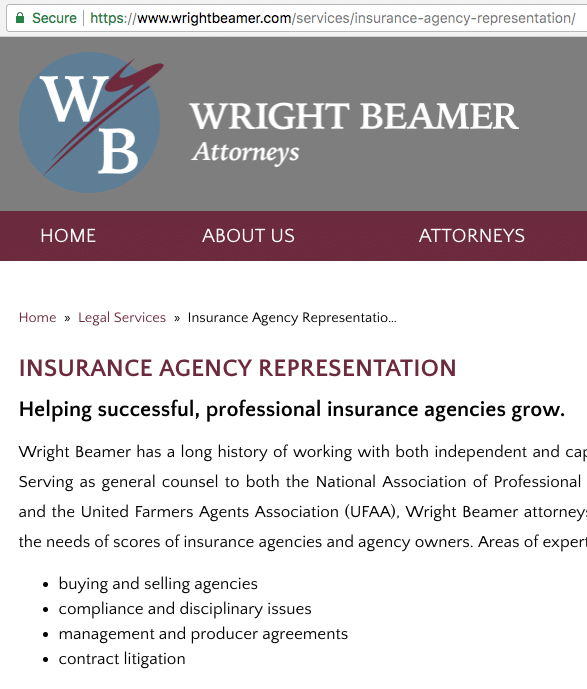Menu
October 23rd, 2017
Picking the name of your law firm might have been an easy process for you. Chances are that, while there are attorneys out there in the world who share a last name with you, they are unlikely to be in the same city or state as you. For the purposes of marketing yourself in the physical world, you can pick your company name and move on with all the other tasks that a small business has to attend to.
But, when it comes to marketing online, you'll need to secure a different name: a domain name (oftentimes ending in .com). You can think of your domain name as the internet name for your firm. The only problem is this: because domain names are registered world wide, your chances for a name collision go up drastically. The best you can hope for is that, if you're lucky, all the people who share a similar firm name are at least practicing in separate practice areas, but don't count on it!
Okay, But What is a Domain Name?
A domain name is an address on the internet that let's you route various services to the right place. For most law firms, the two most common services are your website and your email. Both reference your domain name in order to find the right place to send that traffic.
While there's a lot of technical wizardry that happens when you type in, say, "themodernfirm.com" in a web browser, the basic idea is: when you type in "themodernfirm.com," your computer asks a directory —called a nameserver — where to go to find the "themodernfirm.com" website. The nameserver replies back with an IP address, which is a numerical address of a server on the internet. Your browser then asks that server to give it the website it has associated with "themodernfirm.com," and it happily obliges by serving up the website.
Same thing with your email: when you email info@themodernfirm.com, your email program finds out what server it should try to send that mail to, and then sends it to that server, which then routes it to the right place — usually your inbox!
That's a very high level overview of what happens, but we hope that it serves to tell you one thing: your domain name is the linchpin for the rest of what you end up doing with your online marketing and services.
It's important to note that you can register your domain name with one service, have your website hosted with another, and a yet another service can handle your email. All from a single domain name. It's very cool! (If you do not find this "cool," that is fine! We do, so let's talk.)
Anatomy of a Good Domain Name
Enough with the technicalities, what about actually picking one! Here are some guidelines for how you should be thinking about picking a domain name:
Easy to Spell
If it's not easy to spell, your potential clients might go to the wrong domain name. If you have a name that is commonly misspelled, you might consider leaving that out of your domain name. Ask yourself: how often do your clients get it wrong when they're writing it? If the answer is "often" then you should consider focusing on other elements of your practice, instead, such as your geographic region or practice areas. Or, use your initials, the initials of your partners, or a shortened version of your last name.
We recently launched a site for Chartier & Nyamfukudza, P.L.C., they decided to go with: cndefenders.com
Easy to Type
Another difficulty here is avoiding punctuation like hyphens. These are often hard to type on mobile devices, and our statistics show that increasingly people are primarily using mobile devices to look up law firms.
"smithlawfirm.com" is much easier to type than "smith-law-firm.com"
Short
This goes hand in hand with easy to type. If your domain name is very long its unlikely to be memorable. While something like "thejohnsmithlawfirmofsouthcarolina.com" might be available, no one is going to remember it or want to type it.
Consider trying for something like "smithlawfirmsc.com"
Descriptive
You have a lot of latitude in this area. Your domain name might focus on the firm name, geography, or practice area — or combination of the three. It should, however, be related back to what you do. Registering a name like "carbonatedsodaisthebest.com" might be clever and available but, if there's a conceptual mismatch between the domain name and what you do, people might pass you by in search results. Pick something that will make sense to someone looking through a list of search results.
Generating Ideas for Your Domain Name
So, keeping that all in mind, what is a firm to do? Constraints breed creativity. Keeping those guidelines in mind, here are ways to generate tons of potential ideas:
- If you have a unique, yet short, firm name you might be able to find a solid option by adding ".com" to the end of it. Always start there first!
- If your geography is important to your practice, consider including a city, region, or state within your domain name.
- If you focus on a specific practice area or kind of law, you might include that in your domain name. Maybe you primarily do appeals, then you can look at domain names that are a combination of your firm name and "appeals." We do recommend against stuffing keywords in your domain name unless they are things you specifically want to target. Google used to use keywords in domain names as a ranking factor until it started being abused to game the system.
Minimize The Need to Change Names
Part of a domain's authority with search engines is derived from longevity. Changing a name can cause search rankings drop and create confusion in the marketplace. Not to mention you'll need to update your letterhead, business cards, email signatures, signage and other marketing materials. So, if you think your firm name might be changing in the not-so-distant future (maybe you're going to add a partner), you might consider leaving your firm name out of the domain name or just decide on one name. If your firm name does change though, fret not! We can help redirect any traffic from the old domain name to the new one and mitigate the potential fallout in search rankings. Contact us so we can help you manage the transition!
Planning to Sell Your Firm?
A website and domain name can be very important in adding to the value of a deal when a law firm is sold. Though deals take on many forms, a domain name that is more generic or like a brand name (i.e. arkansas-bankruptcy-help.com) is potentially more desirable or easy to work with when transferring ownership than one based on attorney names.
Checking for Availability of a Domain Name
It's all well and good to have an idea for a name, but how do you check if it's available? Our favorite tool for checking domain availability is from Domain Tools.
https://whois.domaintools.com/
Type in the name you want to check and click on "Search". The tool will tell you if the name is available and then you can continue on with registering it. Whenever we're generating ideas for domains we'll often try out 10-20 of them and come up with a list of good possibilities. From there it's often a gut reaction as to which one is best.
You're free to register a domain name wherever you want and we generally advise that, if you have one registered somewhere already, you register any others at the same location — it'll be easier for you to manage.
Do note that, while most registrars will give you a discount on your first year of registration, when you renew they all end up being about the same price. Budget registrars will often try to upsell you on many other services you might not need.
A Note About Paying for Domain Names that Are Already Taken
Sometimes you'll run across a domain name that might be perfect, yet is already taken (albeit, often, not actually being used for anything). The company that has it registered might be willing to part with it for a certain price — oftentimes an order of magnitude or two higher than what they paid for it. We generally advise that you just keep on looking for a domain name that isn't taken. However, if it's the perfect domain name for you, sometimes it makes sense to grab it. That's a question you'll need to answer for yourself!
Do I Need More than One Domain Name?
Google and other search engines give you no special rankings for using more than one domain name. The only reason you might consider it is if you have an additional marketing reason why you might want one. Say that you have a practice area that you'd like to specifically market to a group. Rather than pointing them to a longer address you can use your shorter purpose-built domain name.
We recently set this up for Wright Beamer, PLC, a Michigan firm that focuses part of its practice on representing and advising insurance agencies. For the practice area page outlining this particular element of their practice, you can either go here:
https://www.wrightbeamer.com/services/insurance-agency-representation/
Or we have this page set up to redirect directly to that page:
Wright Beamer can publish that shortened version in print materials, making it much easier for their potential customers to remember and find that page.
What About .law?
We wrote a post specifically about why we think that a .law domain name is generally not the right choice.
Conclusion
Picking a domain name is an activity you're likely to do just once or twice over the lifetime of your firm. While it can be confusing, it pays to take a little time to look through your options and choose a good foundation for the rest of your online marketing. If you need help with this or anything else, please email us to talk. We're always happy to help.
Categories: Question of the Week








